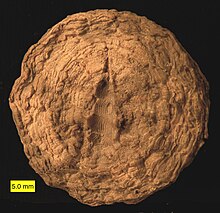Pleurodictyum is an extinct genus of tabulate corals, characterized by polygonal corallites.[1] Colonies commonly encrust hard substrates such as rocks, shells and carbonate hardgrounds.[2]
| Pleurodictyum | |
|---|---|

| |
| P. americanum from the Givetian Kashong Shale (Hamilton Group) of Livingston County, New York | |

| |
| Reverse side | |
| Scientific classification | |
| Domain: | Eukaryota |
| Kingdom: | Animalia |
| Phylum: | Cnidaria |
| Subclass: | †Tabulata |
| Family: | †Favositidae |
| Genus: | †Pleurodictyum Goldfuss 1829 |
| Species: | †P. americanum
|
| Binomial name | |
| †Pleurodictyum americanum Roemer 1876
| |
Distribution edit
Fossils of Pleurodictyum have been found in:[3]
- Silurian
Argentina, Australia, Bolivia, Tajikistan, and the United States (Kentucky, Wisconsin)
- Devonian
Algeria, Australia, Bolivia, Brazil, Canada (Ontario), China, Colombia (Floresta Formation, Altiplano Cundiboyacense), the Czech Republic, France, Germany, Luxembourg, New Zealand, South Africa, Spain, Tajikistan, Turkey, the United Kingdom, United States (Indiana, Kentucky, Michigan, New York, Ohio, Pennsylvania, Tennessee), and Venezuela
- Carboniferous
Czech Republic, Mexico, and the United States (Georgia)
References edit
- ^ Pandolfi, J.M.; Burke, C.D. (1989). "Environmental distribution of colony growth form in the favositid Pleurodictyum americanum". Lethaia. 22 (1): 69–84. Bibcode:1989Letha..22...69P. doi:10.1111/j.1502-3931.1989.tb01170.x.
- ^ Brett, C.E.; Cottrell, J.F. (1982). "Substrate specificity in the Devonian tabulate coral Pleurodictyum". Lethaia. 15 (3): 247–262. Bibcode:1982Letha..15..247B. doi:10.1111/j.1502-3931.1982.tb00648.x.
- ^ Pleurodictyum at Fossilworks.org